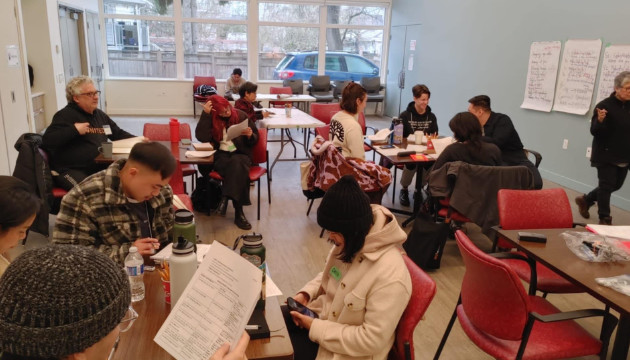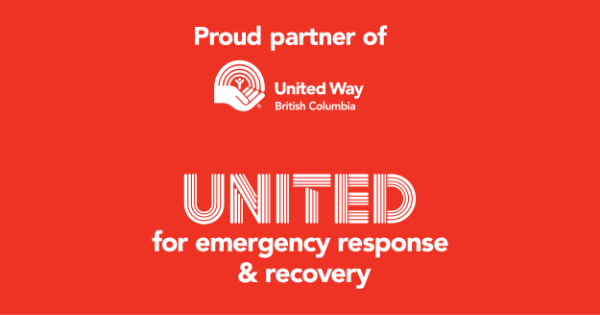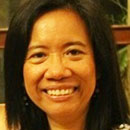October 16, 2025 – On the night of April 26, friends, colleagues, neighbors, current and former students worldwide – some I have not heard from in twenty years – sent text messages and calls offering condolences and support following Vancouver’s “darkest day.”
“Were you at Lapu-Lapu?”Their question’s poetics and ethics (poethics) were not lost on me -- a question filled with care, a potential first tanaga line in English. Tanaga is the Tagalog haiku version with four lines, seven syllables per line. I turned to writing poetry to release intense feelings of loss and sadness.
 The National Pilipino Canadian Cultural Centre held a semester-long Tagalog language learning program in Vancouver, with Nora Angeles, Veronica Caparas and Erie Maestro as instructors.
The National Pilipino Canadian Cultural Centre held a semester-long Tagalog language learning program in Vancouver, with Nora Angeles, Veronica Caparas and Erie Maestro as instructors.
Weeks before, I informed Lapu-Lapu Festival organizer-friends about our Tagalog Language Learning Showcase happening on the same day. I was one of three instructors in this semester-long project of the non-profit society NPC3, funded by the University of British Columbia’s Community-University Engagement Strategy (UBC-CUES).My fellow instructors, Veronica Caparas and Erie Maestro, reminded participants to attend the day-long Lapu-Lapu Day Festival before or after our late afternoon event.
Food trucks at the Festival were beckoning, but many of us went home, full from dinner served. Some of our course participants went to catch the last hour of the festival and witnessed the horrific aftermath.
NPC3 Tagalog Course
Teaching is always a good excuse for learning. We learned a lot more about Filipinos, Filipinos in Canada, and Canadians, from teaching Tagalog to over three dozen students -- aged 7 to 67, majority were Canadian-born from the 1.5 and 2nd generations.
Statistics Canada once considered Filipinos “the fastest growing” but “least understood” visible minority immigrant group in Canada. We have been considered an “underserved community” over-represented in the service economy, “hyper-visible” but “invisible.”
We showed our learners how our languages, especially Tagalog, are comfortable with such paradoxes. We can live with contradictions, and carry these in our heads. We have the same word for suffering (sákit) and illness or disease (sakìt), with variation in meaning caused by syllabic stress, no pun intended. We suffer when we are ill. Mahal could mean either love or expensive. Loving our family especially can be very costly.
Filipinos may be chatty, loquacious, verbose, but we have economy in words. We have ways of being and understanding not easily translatable in English or Western ways of knowing.
In March 2025, the Oxford English Dictionary added the Filipino word gigil to its list of words. Gigil is “an intense feeling caused by anger, eagerness, or the pleasure of seeing someone or something cute or adorable” -- one of those not easily translatable Filipino words. Like another Tagalog word ngitngit, roughly equivalent to infuriated, gigil manifests through tight hand clenching, teeth-gritting, body trembling, pinching or squeezing a person or thing causing this emotion.
Alongside my ngitngit after the tragedy, I felt pride and joy in how Filipinos and our friends in Vancouver, across Canada, and the world pulled their time, talents, efforts and resources together to support Lapu-Lapu Day victims, survivors and each other.
Languages are windows to any culture’s values, or what their people deem important. As Indigenous Philippine cultures are characterized by high levels of relationality, one could expect from such cultures a wide range of root words dealing with relationships based on trust, cooperation, and community-based mutual aid or support.
We have an Indigenous Tagalog word for these values – bayanihan – the community spirit Vancouverites leaned on after the tragedy.It is roughly equivalent to the concept social capital, but it has nothing to do with puhunan (capital). Its root word is bayan (town, country, nation), with derivative words bayani (hero), kababayan (fellow citizens), sambayanan(community),makabayan (patriot, nationalist), kabayanihan (heroism).
Bayanihan is a relational practice based on foundational values of kapwa, one of those untranslatable-in-one-word concepts which means “seeing oneself in the other,” or shared connection with other human beings, which some consider roughly equivalent to empathy, but not quite the same. It is the root word of kapwa-tao (fellow human) and pakikipagkapwa-tao (reciprocity in human relations), or pakikisama (reciprocity for smooth inter-personal relations). Its root word is sama (join), from which come derivative words: sama-sama (together), samahan (association), kasama (comrade), kasamahan (colleague, companion).
The importance of food to our culture, community-building and our healing process is well-known. It is not about the food alone, but the process of eating shared meals with others. Professor Felipe de Leon Jr. of the University of the Philippines explains major Philippine languages has at least 100 verb conjugations of the word kain (eat) based on what one ate, with whom, how, and other possibilities of relationality.
Likewise, I can think of at least eight root words in Tagalog language alone – ingat, linga, lingap, damay, tulong, gabay, bigay, bahagi – leading to dozens of verbs, adjectives, nouns and adverbs denoting care, help, give, share or support. With languages that value a culture of care, it is not surprising 25% of all foreign-trained nurses in the world are Filipinos, or why many Filipinos around the world choose to enter the caring professions.
Of the four Tagalog lessons I gave in the months leading to Lapu-Lapu Day, my favorite was on Philippine proverbs (salawikain), interestingly based on the root word wika (language, speech). But proverbs are not just figures of speech, they are also windows to cultural values, ethics and mindsets.
Two Tagalog proverbs best explain to Canadians why Filipinos all over the world felt secondary trauma from the Lapu-Lapu Day tragedy, and why they quickly galvanized for mutual help and support:
Ang sakit ng kalingkingan,
sakit ng buong katawan.
(Pain of the littlest finger
felt by body together.)
Ang mabigat ay gumagaan,
kung pinagtutulungan.
(Anything heavy gets lighter
when we all help each other.)
Put them together and you have a stanza of four lines, eight syllables per line, same rhythmic pattern – a dalit form of Filipino poetry.
Poet(h)ics in our languages and culture of relationality and care kept our people strong in the aftermath of this tragedy.










